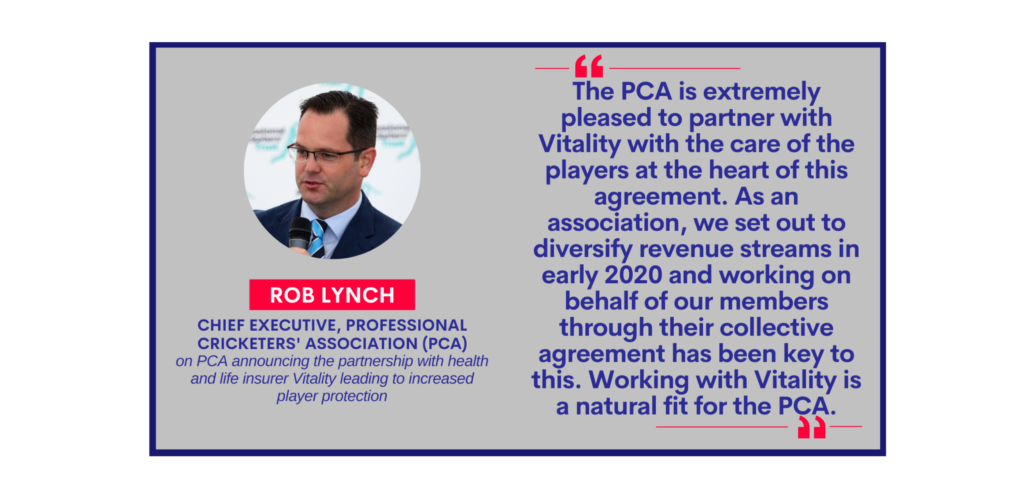Photo Credit: Professional Cricketers’ Association
PCA’s collective agreement leads to increased player protection.
The Professional Cricketers’ Association has announced a ground-breaking partnership with health and life insurer Vitality, that sees domestic male and female players sporting Vitality’s logo on all player helmets.
The PCA and Vitality have capitalised on an asset that has been created as part of the collective rights agreement that professional players in England and Wales signed with the PCA in 2021. The contract allowed their association to work on their behalf as a group to create commercial opportunities. This follows the PCA’s agreement with the Cricket Draft that grants the fantasy cricket competition a licence to use player data.
The Vitality partnership will enable the PCA to further invest in insurance provisions for their members in the form of critical illness cover*. A critical illness policy is currently being formalised as a member benefit to offer further protection for players. The need for this cover was highlighted by Gloucestershire spinner Tom Smith who has worked tirelessly to gather research and educate players and the PCA on the current gap in their insurance policies.
Smith was inspired to support his fellow professionals following the tragic loss of his wife in 2018. Laura, the mother of his two young children, was diagnosed with a rare chronic liver disease and bile-duct cancer and lost her courageous battle following 18 months with the critical illnesses.
The Vitality logo will appear on the helmets of every male and female player in the Vitality Blast, Charlotte Edwards Cup, Royal London Cup and Rachael Heyhoe Flint Trophy.
The stickers debuted in Surrey’s victory over Gloucestershire on Wednesday 1 June and will be seen across the globe through coverage of the white-ball competitions.
PCA Chief Executive, Rob Lynch, said: “The PCA is extremely pleased to partner with Vitality with the care of the players at the heart of this agreement.
“As an association, we set out to diversify revenue streams in early 2020 and working on behalf of our members through their collective agreement has been key to this.
“Working with Vitality is a natural fit for the PCA and our members given the vast support they have provided to our game over recent years. The passion they have shown in understanding why this partnership matters to the players has been heart-warming.

Photo Credit: LinkedIn Profile Photo of Rob Lynch
Gloucestershire player, Tom Smith, said: “Critical illness cover is something I am all too familiar with through my own circumstances, following the death of my wife in 2018. The importance of this insurance to all professional players is really vital and my family is proof of that.
“I want to thank Vitality for their investment in the players through this game-changing deal that offers great comfort to all. I enjoyed being one of the first players to wear the logo on my helmet at the Kia Oval and on behalf of every player, thank you Vitality.”
Vitality Programme Managing Director, Nick Read, said: “We are delighted to announce our partnership with the PCA today. We have invested within men and women’s cricket for many years, supporting the development of the game and inspiring millions more people to get more active. This partnership is a natural extension of this, allowing us to support a very important cause, that as a life insurer is very close to our heart.”
* Critical Illness plans (sometimes referred to as Serious Illness Cover) provides cover if you are diagnosed with a critical illness like cancer, paying out a lump sum.
Name of Author: Professional Cricketers Association
The Professional Cricketers’ Association (PCA), founded in 1967 by former England fast bowler Fred Rumsey as the Cricketers’ Association, represents past and present first-class cricketers in England and Wales. In the 1970s, the PCA established a standard employment contract and minimum wage for professional cricketers. It also helped create a pension scheme in 1995 and launched the magazine All Out Cricket and the ACE UK Educational Programme in 2002.

















































